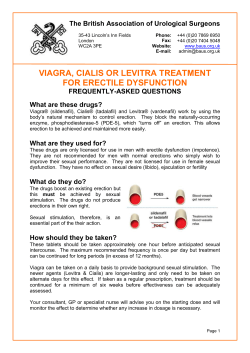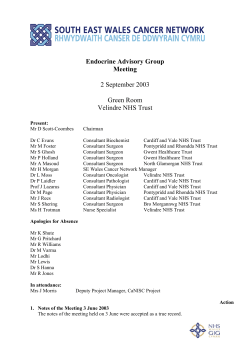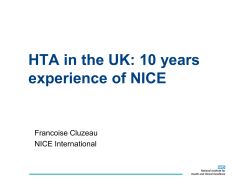
Proposed Changes to NHS Availability of Erectile Dysfunction Treatments
Proposed Changes to NHS Availability of Erectile Dysfunction Treatments Changing Prescribing Restrictions for Sildenafil January 2014 You may re-use the text of this document (not including logos) free of charge in any format or medium, under the terms of the Open Government Licence. To view this licence, visit www.nationalarchives.gov.uk/doc/open-government-licence/ © Crown copyright Published to gov.uk, in PDF format only. www.gov.uk/dh 2 Proposed Changes to NHS Availability of Erectile Dysfunction Treatments Changing Prescribing Restrictions for Sildenafil Prepared by Prescribing Policy and Legislation Team, Department of Health 3 Contents Executive summary .................................................................................................................... 5 Introduction and background...................................................................................................... 6 Legislative and Policy Background……………………………………………………………..6 Condition Prevalence and Treatments…………………………………………………………………6 Consultation Proposals and Questions………………………………………………………………...7 Costs and Benefits of Proposals……………………………………………………………………......7 Costs……………………………………………………………………………………………….7 Patient Benefits……………………………………………………………………………….....10 Wider Societal Considerations…………………………………………………………………………10 Supply…………………………………………………………………………………………………….11 Other Changes…………………………………………………………………………………………..11 Responses to the Consultation ……………………………………………………………………….12 Timetable…………………………………………………………………………………………12 Annex A: Draft Amended Regulations relating to drugs for the treatment of Erectile Dysfunction………..13 4 Executive summary This consultation seeks views on our proposals to remove the prescribing restrictions for generic sildenafil which are set out in Schedule 2 to the NHS (General Medical Services Contracts) (Prescription of Drugs etc.) Regulations 2004. The case for change Some treatments for erectile dysfunction are currently restricted on NHS prescription. They are only available on prescription in certain circumstances. The treatments were originally restricted in 1999 in order to manage NHS spending on them. The ED treatment Viagra lost its UK patent protection in June 2013 and as a result cheaper generic products are now available. The Department estimates that these cheaper generic products are affordable on NHS prescription and their availability can bring health benefits for patients. We invite comments on these proposals and, in particular, responses to the questions set out in this document. 5 Introduction & Background Legislative and Policy Background 1. Erectile dysfunction (ED) treatments are currently restricted on NHS prescription. The restrictions are set out in legislation and the treatments can only be prescribed by the NHS for ED in certain circumstances on the NHS. Originally the main reason for the restrictions was to keep the cost of treating men with impotence to between £10 and £12 million a year. Even with these restrictions in place, NHS spend on all erectile dysfunction treatments in 2012 was over £80million, of which around £40 million was for Viagra. 2. In 1999 the Department of Health undertook formal measures to restrict NHS prescription of erectile dysfunction treatments in NHS primary care. In England, the restrictions are through national prescribing legislation, with the European Commission’s Transparency Directive providing the basis of these restrictions. Article 7 of the Transparency Directive allows member states to notify the Commission of measures regulating the pricing of medicinal products. One of the UK’s notified criteria, criterion 5 sets out that certain medicinal products may be excluded from NHS prescription (except in specified circumstances, or except in relation to specified conditions or categories of condition, or specified categories of patient). This criteria forms the basis of the restrictions of the ED treatments. 3. The prescribing restrictions in England are set out in Schedule 2 to the NHS (General Medical Services Contracts) (Prescription of Drugs etc.) Regulations 2004. The regulations mean that GPs cannot prescribe the products except in certain circumstances, for example, for patients with underlying health conditions causing ED, such as diabetes or prostate cancer. GPs will be in breach of their contractual terms of service if they prescribe the treatments outside of the defined circumstances. 4. Viagra lost its patent protection in the UK in June 2013. Following this, the price of generic preparations of sildenafil have dropped by around 93% of the price of branded Viagra – dropping from £21.27 to £1.45 for a 4 tablet pack (see Table 1 below). As generic sildenafil is now available more cheaply, the Transparency Directive notification may no longer apply. Carefully balancing cost to the NHS and benefits to patients, we consider removing the restrictions for generic sildenafil provides the greatest benefit and we do not propose to seek to restrict it under other notifications to the European Commission. 5. This consultation sets out the case for change and is seeking comments on our proposals to remove the statutory prescribing restrictions for generic sildenafil. Condition, Prevalence and Treatments 6. 1 Erectile dysfunction (ED), also known as impotence, is the inability to get and maintain an erection that is sufficient for satisfactory sexual intercourse. ED is a very common condition, particularly in older men. It is estimated that half of all men between the ages of 40 and 70 will have ED to some degree.1 ED can have physical, psychological or medicinal causes. http://www.nhs.uk/Conditions/Erectile-dysfunction/Pages/Introduction.aspx 6 Proposed Changes to NHS Availability of Erectile Dysfunction Treatments 7. Treatment of ED varies depending on the cause of the problem and can include - lifestyle changes to reduce the risk of cardiovascular disease, prescribing appropriate medication, treating an underlying health condition, such as heart disease or diabetes, psychological treatments such as cognitive behavioural therapy or sex therapy or looking at alternative available medicines if a medication is causing ED. 8. Medication, such as sildenafil (brand name Viagra), can be used to successfully manage ED in at least two-thirds of men. Sildenafil forms part of a range of treatments for ED called PDE5 inhibitors. PDE5 inhibitors are clinically indicated for the treatment of erectile dysfunction and include sildenafil citrate, tadalafil and vardenafil. At present prescribing of all of these treatments is restricted for NHS patients. Consultation Proposals and Questions 9. We are proposing to remove generic sildenafil from the list of erectile dysfunction treatments which are restricted on NHS prescription by amending Schedule 2 to the NHS (General Medical Services Contracts) (Prescription of Drugs etc.) Regulations 2004. The other listed PDE5 inhibitors – tadalafil, vardenafil and branded Viagra will continue to be restricted. The effect of these changes will be that GPs or other relevant prescribers may prescribe generic sildenafil for patients without any of the present prescribing restrictions. A copy of the draft amending regulations is available at Annex A. As there have not been any changes to the licensing or costs of the other ED treatments, including branded Viagra, the prescribing restrictions will remain in place for these treatments. Consultation Questions 1 Do you agree with our proposals to make sildenafil available on NHS prescription? 2 Please can you explain your answer to question 1. The costs and benefits of the proposed regulations Costs 10. Removing the NHS prescribing restrictions on generic sildenafil is likely to lead to a significant increase in demand for these products. However, our analysis suggests that because generic sildenafil is now much lower than the cost of branded Viagra, even with an increase in demand, the overall cost to the NHS of supplying these products will be less than when they were in-patent with access restrictions in place. Our analysis sets out that following the expiry of Viagra’s patent, we expect overall NHS expenditure on ED to reduce from about £144m to £104m a year. Implementing our proposals to allow unrestricted access to generic sildenafil, overall NHS expenditure would be about £110.7m a year. 7 11. We have monitored the price of branded Viagra since June and it has continued to be priced at a significant premium to the generic, with prices for 50mg Viagra preparations increasing from £19.34 to £21.27 for a 4 tablet pack and from £38.67 to £42.54 for an 8 tablet pack. We do not expect to see any reduction in the price of branded Viagra. 12. Following patent expiry the cost of generic sildenafil is currently about 93% cheaper than the branded product (see table 1 below). This means that if current prescribing levels remained, NHS medicines expenditure on sildenafil would drop from £40 million to around £2 million a year. If, as we expect, demand significantly increases for example it doubles or even trebles the cost of sildenafil products would be £4 million and £6 million respectively. Table 1: Price of Sildenafil in Drug Tariff - June and November 2013 Costs June 2013 Costs November 2013 Percentage price reduction Sildenafil 25mg x 4 tablets £16.59 £1.31 92% Sildenafil 50mg x 4 tablets £21.27 £1.45 93% Sildenafil 100mg x 4 tablets £23.50 £1.55 93% Average Price Reduction 93% 13. The current restrictions mean that some men seeking treatment on grounds of severe distress have to be assessed and treated by specialist services rather than by their GPs. The proposed changes would result in many of these patients transferring to primary care, providing a net saving to the NHS on this aspect of care, as well as the convenience for patients of being able to be seen by their own practice. 14. We recognise that the cost of the product only forms one part of the overall costs to the NHS and that widening NHS access to sildenafil will lead to greater costs elsewhere. There would be an additional burden on primary care, in particular for GPs, as each new patient requires an average of 1.9 consultations per year at a cost of about £68. There will also be additional costs relating to dispensing fees when the medicines are dispensed under an NHS prescription. However, any changes will bring in revenue for the NHS from any prescription charges. 15. The Impact Assessment includes full modelling of the cost impact – a summary of the main analysis of costs is set out in Table 2 below. In summary, the analysis sets out that the expiry of the Viagra patent should lead to a reduction in NHS expenditure on ED from about 8 Proposed Changes to NHS Availability of Erectile Dysfunction Treatments £144m to £104m a year and if we allow unrestricted access to generic sildenafil, overall costs would be about £110.7m a year. Table 2: Overall cost of ED to NHS England 2012 £m pa Currently Viagra Costs if Prescriptions for sildenafil double in primary off patent care sector (1) (2) (3) 84.9 47.1 48.1 Dispensing costs 2.8 2.8 3.6 Prescription char ges -4.2 -4.2 -5.4 20 sector 3.3 0.9 0.9 Devices 5.5 5.5 5.5 GP 10.8 10.8 16.8 Specialist 28.8 28.8 28.8 12.3 12.3 12.3 144.2 104.0 110.7 Drugs 10 sector NIC Consultations Psychosexual therapy Total Consultation Questions 3 Do you agree with our assessment of costs to the NHS? 4 Please can you explain your answer to question 3. 9 Patient Benefits 16. We have identified benefits for patients in derestricting supply of low-cost ED treatments on the NHS. Under the current restrictions, men who do not fit within the criteria for NHS treatment can have the products prescribed privately. Prior to Viagra’s patent loss, these prescriptions could be relatively expensive. There is evidence that illegal or unsafe supplies of medicines for the treatment of erectile dysfunction, including sildenafil are obtained from the internet. This illegal activity is subject to enforcement action by the MHRA but it cannot be completely eliminated. Cost only forms part of the reasons for bypassing the healthcare system, with some patients being embarrassed about seeing their GP and others wanting to buy in bulk or to access the drug for use outside its licensed clinical indication. If the supply of generic sildenafil for ED is not restricted on NHS prescription, we believe that some of these patients will benefit from seeking advice from their GP and receiving properly regulated treatments on the NHS. 17. Sildenafil for ED should only be used with caution for patients with heart disease and can also have harmful effects on patients taking certain medicines. Widening the availability of the ED treatments on the NHS could lessen these risks for patients seeking illegal or unsafe internet supplies. 18. The healthcare benefits are likely to be wider than assuring patients of access to safe, properly regulated medicines. Erectile dysfunction as a condition may in some circumstances be an early indicator of vascular disease. More than two in every three ED sufferers has at least one comorbidity such as high blood pressure, high cholesterol, diabetes or depression. Accordingly, derestricting NHS access to generic sildenafil for ED could lead to those patients seeking NHS treatment and receiving screening for more serious disorders - encouraging earlier diagnosis and treatment. Consultation Questions 5 Do you agree with our assessment on the benefits for patients in widening access on the NHS to generic sildenafil? 6 Please can you explain your answer to question 5. Wider societal considerations 19. When the ED treatments were originally restricted, there was a debate about whether the NHS should fund what some considered “lifestyle” treatments. At that time, the Government decided that the costs were too much for the NHS to allow unrestricted access, but that some patients with underlying health conditions causing ED should have access to the treatments on the NHS. Now that generic products are available more cheaply, cost is not the main barrier that it used to be and we better understand the potential health benefits for a wider spectrum of patients we believe that on balance it is in the best interest of those patients to widen NHS access to the ED treatments and remove the current restrictions. 10 Proposed Changes to NHS Availability of Erectile Dysfunction Treatments 20. We do not want NHS prescribers or commissioners to face un-manageable demands for access to treatments, particularly from people seeking the ED treatments for recreational purposes. NHS England may consider whether it will be helpful to develop relevant prescribing guidance for NHS prescribers on how to manage demand. Consultation Questions 6 Do you believe it will be helpful to issue prescribing guidance to accompany regulation change? 7 Can you please explain your answer to question 7. Supply 21. We recognise that the expected increase in demand for generic sildenafil may lead to supply issues. In advance of any regulation change we will alert generic manufacturers to the changes in prescribing restrictions and hence the possibility of an increased demand for sildenafil. 22. All of the ED treatments are regulated as prescription only medicines at present. This means they are only available on prescription or through a Patient Group Direction (PGD). PGDs allow the supply of the ED treatments by named regulated health professionals – most commonly through pharmacies, in a similar way to how flu jabs are provided. The ED treatments are currently available through a range of providers with the appropriate PGD. Other changes 23. As we are making the changes to the regulations for generic sildenafil, we will also take the opportunity to remove four products from the listing as they are no longer relevant. The products are : Alprostadil, which has no extant patent Apomorphine, whose patent for ED was discontinued in 2006 Moxisylyte and thymoxamine, which have no extant patent and are not licensed for use in ED. 24. Some of the ED treatments have alternative licenses for other conditions. Sildenafil is available as a branded preparation, Revatio, and Tadalafil as Adcirca to treat pulmonary arterial hypertension (raised blood pressure within the pulmonary arteries - the blood vessels that supply the lungs). Tadalafil is also licensed as Cialis for the treatment of benign prostatic hyperplasia (an enlarged prostate). The regulations are currently worded to ensure that the restrictions do not apply when sildenafil and tadalafil are prescribed to treat these conditions. The prescribing restrictions only apply when these treatments are prescribed for ED. We will ensure that any changes to the prescribing regulations will not alter patient access to the ED treatments when they are used in these alternative conditions. 25. A copy of the draft regulations are available at Annex A. 11 Responses to the Consultation Timetable 26. This consultation opens on Thursday 23rd January 2014 and will close on Friday 21st March 2014. Our preferred method of receiving your response is via our on-line consultation questionnaire, which can be found alongside this consultation document. 27. Alternatively, you may complete the response form and e-mail it to us at edconsultation@dh.gsi.gov.uk. The response form can be found alongside this consultation document. 28. Postal responses can be sent to: Prescribing Policy and Legislation Team Department of Health Room 2S16 Quarry House Quarry Hill Leeds LS2 7UE 29. A hard copy of this consultation document, and the corresponding response form, is available on request, using the email address. If you have any questions about the content of this consultation then please send them to: edconsultation@dh.gsi.gov.uk 12 The National Health Service (General Medical Services Contracts) (Prescription of Drugs etc) (Amendment) Regulations 2014 ANNEX A Second Draft: 29/11/2013 STATUTORY INSTRUMENTS 2014 No. NATIONAL HEALTH SERVICE, ENGLAND The National Health Service (General Medical Services Contracts) (Prescription of Drugs etc) (Amendment) Regulations 2014 Made - - - - 2014 Laid before Parliament Coming into force - 2014 - 1st May 2014 The Secretary of State for Health, in exercise of the powers conferred by sections 88 and 272(7) and (8) of the National Health Service Act 2006(2), makes the following Regulations. Citation and commencement 1.—(1) These Regulations may be cited as the National Health Service (General Medical Services Contracts) (Prescription of Drugs etc) (Amendment) Regulations 2014. (2) They come into force in May 2014. Application 2. These Regulations apply in relation to England only. 2 () 2006 c.41. Section 88 of the National Health Service Act 2006 (“the Act”) enables the Secretary of State to give directions in regulations to a contractor or contractors about the drugs, medicines and other substances which may or may not be ordered for a patient in the provision of medical services under a general medical services contracts. The Act was amended by the Health and Social Care Act 2012 (c.7). The powers exercised in making these Regulations are exercisable by the Secretary of State only in relation to England, by virtue of section 271(1) of the Act. 13 Amendment of Schedule 2 to the National Health Service (General Medical Services Contracts) (Prescription of Drugs) Regulations 2004 3. In Schedule 2 to the National Health Service (General Medical Services Contracts) (Prescription of Drugs) Regulations(3) (drugs, medicines and other substances that may be ordered only in certain circumstances), in column 1 of the table (drugs), in the entry relating to drugs for the treatment of erectile dysfunction— (a) for the words “The following drugs for the treatment of erectile dysfunction—” substitute “The following drugs—”; (b) omit the words “Aprostadil”, “Apomorphine Hydrochloride”, “Moxisylyte Hydrochloride” and “Thymoxamine Hydrochloride”; and (c) for the word “Sildenafil” substitute “Viagra”. Signed by authority of the Secretary of State or Health Date Name Parliamentary Under Secretary of State Department of Health EXPLANATORY NOTE (This note is not part of the Regulations) These Regulations amend the National Health Service (General Medical Service Contracts) (Prescriptions of Drugs etc) Regulations 2004 (S.I.2004/629) which make provision in respect of the drugs, medicines and substances that may be ordered for patients in the provision of services under a general medical services contract within the meaning of section 84 of the National Health Service Act 2006. Regulation 3 makes amendments to the table in Schedule 2 (drugs, medicines and other substances that may be ordered only in certain circumstances). Schedule 2 restricts the circumstances in which certain drugs, medicines and other substances specified in column 1 of the table may be ordered for the category of patients described in column 2 of the table for the purpose specified in column 3 of the table. Entries relating to Aprostadil, Apomorphine Hydrochloride, Moxisylyte Hydrochloride and Thymoxamine Hydrochloride, which previously appeared in column 1 of the table relating to drugs which may be ordered for the treatment of erectile dysfunction, have been removed from that column as these products are either no longer in patent or licensed for the treatment of erectile dysfunction. In addition, provision has been made to remove generic Sildenafil from the scope of the prescribing restrictions in Schedule 2 while continuing to impose those restrictions in relation to its branded formulation Viagra. 3 () S.I. 2004/629.Schedule 2 was amended by S.I. 2004/3215, S.I. 2009/2230, S.I. 2010/2389, S.I. 2011 680 and 1043 and S.I. 2013/363 and 2194. 14
© Copyright 2025














